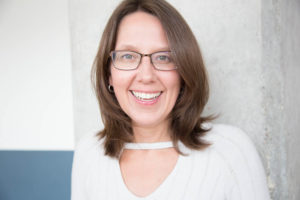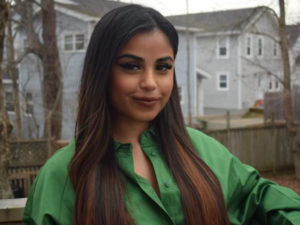Kaarina Stiff
Kaarina Stiff first studied journalism in the early 1990s then worked as a reporter for a community newspaper before leaving the industry. She took a long hiatus from journalism until 2014 when she started a freelance writing and editing business for corporate clients.
After starting her freelance business, she began to look around for ways to upgrade her skills. She came across the University of King’s College Data Journalism Summer School program which takes a one-week intensive approach to teach valuable skills including data analysis and computer programing. “A part of me loves to dive into data and so the data journalism summer school at King’s really appealed to me,” she said.
 Stiff took the Data Journalism Summer School program in 2015 and returned in the summer of 2016 for the advanced summer program. Initially, she confesses, she did not use what she learned, so in 2019 she came back to King’s to retake the program. It was while she was at King’s in 2019 that she learned about the Master of Journalism program and met some of the faculty members. “I decided this was the program I wanted to do.”
Stiff took the Data Journalism Summer School program in 2015 and returned in the summer of 2016 for the advanced summer program. Initially, she confesses, she did not use what she learned, so in 2019 she came back to King’s to retake the program. It was while she was at King’s in 2019 that she learned about the Master of Journalism program and met some of the faculty members. “I decided this was the program I wanted to do.”
Although Stiff’s hope to move to Halifax for the on-campus experience was shuttered due to the pandemic, she was impressed at how the staff adjusted to online learning. “It went a lot more smoothly than I had anticipated,” she explained.
Students are required to work on a professional project as part of the program. It is a nine-month assignment where they identify an issue they are passionate about and hone in on it. Stiff’s project was influenced by Dr. Ingrid Waldron’s work on environmental racism which has brought attention to the relationship between the places where industrial polluters locate and where racialized, marginalized and Indigenous people live. The project also gave Stiff the opportunity to apply those data journalism skills. “I became very interested in that topic and because I was also very interested in data, I was trying to find a way to put these two things together,” she said.
In her project, Stiff focused on a Black community in Windsor, Ont., near the border of Ontario and Michigan, that has a huge concentration of industrial activities. She spoke with members of the community and advocates in the area who have been working on various antiracism campaigns for many years. She is currently working on having her project published to contribute to the bigger conversation of addressing environmental racism.
Stiff encourages incoming students to ask questions. “I think that sometimes as students we feel shy to ask questions or you know, worry that questions are silly,” she says. “The more you ask, the more you get out of the program.”
To her fellow graduates she suggests thinking about what they want to do with everything they learned in the past two years. “There can be a temptation to just say school is finished now I’ve got to get to work,” Stiff said. The program showed Stiff and her classmates the different types of journalism work they could get involved in such as advocacy journalism, environmental journalism, solutions journalism, etc. “I have a much more open mind to where the possibilities lie and so it doesn’t need to mean getting a job in a traditional newsroom,” she said.
Stiff plans to continue doing freelance work while she keeps herself open to whatever possibilities are out there for her.
Rachael Dyal
 After doing her post-graduate studies in journalism at Humber College, Rachael Dyal decided to come to the University of King’s College to pursue a Master of Journalism degree. “I wanted to really dive deep and see the type of beats I wanted to cover in journalism and just explore further,” she explains.
After doing her post-graduate studies in journalism at Humber College, Rachael Dyal decided to come to the University of King’s College to pursue a Master of Journalism degree. “I wanted to really dive deep and see the type of beats I wanted to cover in journalism and just explore further,” she explains.
Dyal appreciates that her classes were smaller because it was easier to know everyone, what they were working on, and to connect with each other. “I learned from so many knowledgeable professors in the industry who were great reporters in their time,” she adds. Most of the program took place virtually except for one class.
The in-person class was one of most memorable experiences at King’s. She learned a lot about videography and how to be a video journalist and a broadcast journalist. It “was an unforgettable experience,” she says. In another one of her courses, she had the opportunity to cover human trafficking. “I was hesitant to dive in…because it’s such a sensitive topic.” Dyal immersed herself in the work, speaking with many survivors of human trafficking and organizations that help them. That experience “was one of the biggest highlights” of the program for her.
In the winter semester Dyal took a course with Professor Claire Ward which helped her realize she wants to focus on investigative journalism to pursue social justice topics. “If it wasn’t for her course, I think I would still be in the battle of, ‘what kind of journalist do I want to be?’” she explains.
Dyal, who is an avid comic book reader, did her professional project on LGBTQ+ representation in comic books. “I noticed I was always reading comics from big publishers that didn’t have a lot of LGBTQ+ comic book characters in them,” she explains. The few comic books that included LGBTQ+ representation mostly had token characters or side characters. Dyal did an in-depth study to get the perspectives of Canadian and American comic book artists who are creating more LGBTQ+ comic books with nuanced characters. “I wanted to see what was being done in terms of meaningful representation and this medium, comic books, with regards to the LGBTQ+ community,” she says.
To prospective students, Dyal beckons, come to King’s. “I’m not just saying that to hype up the program because I went there but you learn from incredible professors who have experience in the field by doing this work for years.”
Dyal is looking forward to working in investigative reporting. “That’s definitely something I see myself doing in the future because I love long form journalism,” she says. Chuckling, she confesses she knew the “what’s next” question was coming and had been a little anxious about it because she was always the person who didn’t know what she wanted to do in the future. Now she knows she enjoys using public records and data to tell stories. But first, she would like to travel. Doing a master’s program amid a pandemic is not easy. “I’m sure many of my [fellow] graduates can agree, we all need a break, you know, just to mentally reset.”
Photo of Kaarina Stiff by Wendy van Hardeveld

